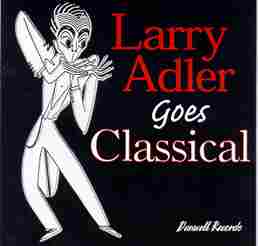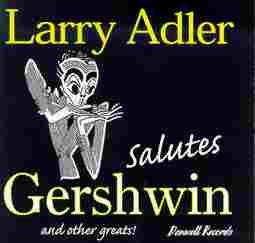The Free-Reed Review
Critiques of Compact Discs, Books and Music Scores
Double CD Review:
|
No.1: Larry Adler Goes Classical

total time: 44:56
Released in 1999
review date: June 1999
Label: Danwell Records http://www.danwellrecords.com (1019-2)
7785 Skyhill Drive
Los Angeles, CA. 90068
USA
Phone: 888 355-6665 or (323) 969-9934
FAX: (323) 969-9984
|
Program:
- Grigoras Dinicu: Hora Stacatto
- Claude Debussy: Claire de Lune
- Maurice Ravel: Bolero
- Manuel De Falla: Ritual Fire Dance
- Maurice Ravel: Pavane
- George Enesco: Romanian Rhapsody
- Sharm El Sheik
- Bach/Gounod: Ave Maria
- Hugo Alfvén: Swedish Rhapsody
- Debussy: Habenera
- Joaquin Rodrigo: Concerto D'Aranjuez
- Beethoven: Minuet in G
- Khatchaturian: Sabre Dance
|
|
No. 2: Larry Adler Salutes Gershwin and Other Greats

total time: 51:13
Released in 1999
Label: Danwell Records (1018-2)
Review date: June 1999
|
Program:
- Scott Joplin: The Entertainer
- Gershwin Medley:
- Summertime
- It Ain't Necessarily So
- Bess, You Is My Woman Now
- There's a Boat Dat's Leaving
- Blues
- Larry Adler: Genevieve
- Gershwin: I Got Rhythm
- Massenet: Meditation
- Gettysburg Address (Battle Hymn of the Republic)
- Screws Blues
- Gershwin: Lullaby
- Gershwin: Embraceable Yo
- Adler: High Wind In Jamaica
- Gershwin: Summertime (Reprise)
- Gershwin: Rhapsody In Blue
|
Review by Henry Doktorski:
Larry Adler is the dean of concert mouth-organists. Born in 1914, he
studied piano as a child, but was expelled at the age of twelve from the
prestigious Peabody Conservatory in Baltimore for playing "Yes, We Have No
Bananas" instead of a waltz at a piano recital. Two years later, Adler
realized his life's work when he won the first prize silver cup in a
harmonica contest sponsored by the Baltimore Sun newspaper. He has been
playing ever since. (I heard him perform live in concert -- at the age
of 83 -- with the Pittsburgh Symphony Pops in 1997. See A Living
Legend: Interview with Larry Adler.)
Early in his career he showed his preference for the classics which were
appreciated by high society. Instead of "Turkey in the Straw" or "St.
Louis Blues," Adler played pieces such as the Vivaldi violin concerto, the
Bach A Minor violin concerto, the Marcello oboe concerto, short pieces by
Fritz Kreisler and Albeniz, as well as the Rhapsody in Blue and the great
standards by songwriters George Gershwin, Jerome Kern, Cole Porter and
Richard Rodgers. In the 1950s, classical composers such as Ralph Vaughan
Williams and Darius Milhaud wrote original works for Adler.
Although there are no original works for harmonica on these CDs, with the
possible exception of the two selections from the British movies
"Genevieve" and "High Wind In Jamaica" which were composed by Adler
himself, the program offers an exciting selection of transcriptions. Adler
is accompanied on some numbers by piano and on others by full symphony
orchestra or dance band. I cannot praise the musicianship highly enough.
Adler exhibits an effortless virtuosity on the mouth organ; his
arrangements span the full range of his four-octave instrument and show
off his ability to perform two-part counterpoint. Beethoven's "Minuet in
G" is unaccompanied. Adler's transcription needs no accompaniment; his
double-stop counterpoint provides its own harmonic background.
Some of the pieces are introduced with a spoken monologue by Adler,
presumably recorded from some of his live performances. (During the solo
Minuet I could hear audience noises.) I believe a great part of Adler's
success was his charming personality; he could be very funny at times. I
especially enjoyed Adler's spoken introduction to Gershwin's Rhapsody
in Blue:
"When I was about sixteen years old, Paul
Whiteman played on the bill at the Roxy Theater with his own film, The
King of Jazz, and I used to hang around outside the stage door and no
matter who came in or out, I'd blow the mouth organ at them, thinking I
might get a job.
"So one day the great jazz saxophonist Frankie Trumbower heard me play and
he took me into Whiteman's dressing room and said, 'Paul, listen to this
kid.' I played Poet and Peasant. When I finished, Whiteman said, 'Play
Rhapsody In Blue.' Well, I was sixteen and I couldn't play Rhapsody In
Blue, but neither could I admit it. So I said, 'I don't like Rhapsody In
Blue.'
"Whiteman turned to a young man sitting in the room and said, 'What do you
think of that, Gershwin? He doesn't LIKE Rhapsody In Blue!'"
Two tracks deserve special mention due to their uniqueness. The Gettysburg
Address is simply that: a woman actress reciting Abraham Lincoln's speech
accompanied by Adler playing "The Battle Hymn of the Republic" on solo
mouth organ. It seemed a little odd to me to include that on this CD, but
I suppose it does have historical value. Another unusual track was the
Bach/Gounod "Ave Maria" for harmonica and rock combo: guitar, drums and
bass guitar. The tempo was faster than I have ever heard; it was almost
danceable in an easy-listening light-rock style.
My favorite tracks, of course, were the pieces from the top-forty
classical hit parade with orchestral accompaniment: Debussy's Claire de
Lune, De Falla's Ritual Fire Dance and Khatchaturian's Sabre Dance were
performed with expertise, fire and aplomb. On the other hand I thought
Ravel's Bolero was for the most part boring, but my ears perked up
slightly during the section toward the end when the piano played the
melody and Adler doubled two octaves and a major third higher.
On the Gershwin CD, I especially enjoyed Scott Joplin's Entertainer, for
mouth organ and pizzicato string orchestra: a superb arrangement. The
Gershwin medley for harmonica and piano was also memorable due to the
beautiful and sensitive duet playing.
These two CDs by Danwell Records are re-mastered recordings of previously
released Adler LPs, some which were recorded live. The sound is amazingly
clear and free from scratches and hiss which one would expect on
recordings which are several decades old. The engineers deserve
commendation for their fine work.
Although the performances and mastering are superb, the CD booklet track
titles leave something to be desired. I would have liked to know 1) when
the selections were recorded, 2) who was the pianist accompanying Adler,
3) which orchestras were playing, and 4) who were the arrangers. In
addition, the composers of the pieces were not mentioned in the CD
booklet, only the titles, and one of them, Dinicu's Hora Stacatta was even
misspelled.
Yet despite these inconveniences, I dare say that this album will be
treasured by aficionados of the classical harmonica; I personally am
thrilled to have them in my collection.

